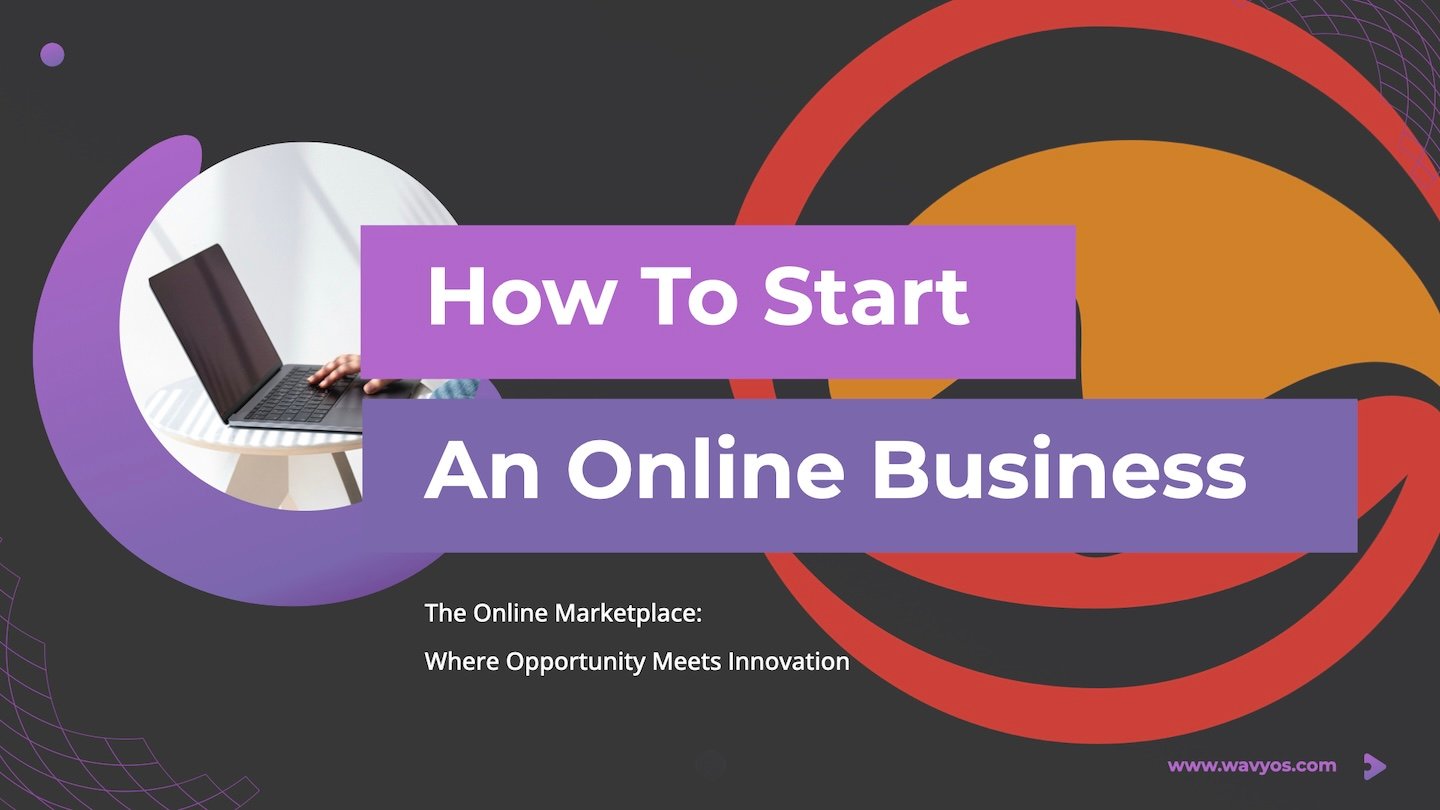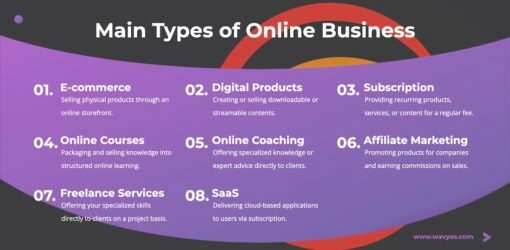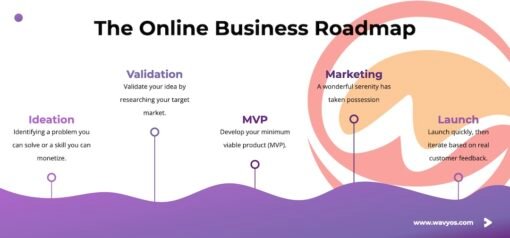How To Start An Online Business?

The Online Marketplace: Where Opportunity Meets Innovation
For anyone wanting to start an online business, no matter they’re looking to turn a passion into a side hustle or seeking an additional location-independent income, opportunities in the online marketplace abound. Although there is a seemingly oversaturated growth in e-commerce, new technologies are bringing new possibilities. The digital world continues to evolve and expand to meet unaddressed needs. Along with the rising concerns about digital wellbeing, authentic connection, and identity protection, customers are seeking new experiences, more personalized and smarter digital services to simplify and enhance their daily lives. The online marketplace is no longer just a space for browsing and shopping. To pioneer business owners it is an adventurous and exciting world for them to define and create their new domain.
Easy to start a New Business? Never. Possible? Absolutely
The reality is, the idea of starting and running their own online venture can feel overwhelming for most people. The challenges extend well beyond business fundamentals. With fairly limited resources, typically owners have to handle every aspect of the business at the very beginning. To name a few, to-dos for a new business would include creating brand elements, building a new website, managing social media and perhaps answering customer inquiries too. When orders start to come in, naturally orders fulfillment (pick, pack, ship) and returns will be added to the growing workload. All of these tasks are very tedious and time-consuming. Some may even require specialized expertise or know-how. For that matter the owner either needs to invest time learning new skills or allocate more funds to outsourcing these functions.
Success comes later. Be it online or traditional, it is never easy to start a new business from day one. However, you shouldn’t stop there. By breaking down the process into strategic plans with clear goals, adequate preparations and actionable items, you can make this journey manageable. From e-commerce stores, purchasing clubs and subscription services to digital products and professional consulting, let’s explore the diverse world of online business models and examine how to make your vision a reality. After all launching an online business isn’t as scary as it might appear.
Main Types of Online Business
From online shopping and video sharing to social media, dating, food delivery and no-code development, new digital platforms emerge constantly. Let’s examine the most viable online business models that have consistently proven successful for entrepreneurs or solopreneurs. Each model might offer unique advantages while requiring specific skills and varying levels of initial investment. You have to take note though, strategic pricing, marketing expertise and customer service excellence are essentially the main ingredients of success across all business types.
#1 E-commerce Store:
An e-commerce store sells physical products through an online storefront. Products can range from niche boutique items to broad marketplace offerings. Starting an e-commerce store requires strategic product selection, effective sales channel management, compelling product photography, efficient inventory management and shipping logistics.
#2 Digital Product Distribution:
Digital Product Distribution involves creating, selling or reselling downloadable or streamable contents like e-cards, e-books, templates, software, funny memes, market research report or other media. It offers relatively lower overheads with no physical inventory or shipping concerns. Starting such an online business requires unique, high-quality content, secure file hosting and automated delivery systems.
#3 Subscription Services:
A Subscription Service provides recurring products, services, or content for a regular fee. Examples include monthly boxes, content memberships, or access to online software and services. It can operate independently or as an extension of an e-commerce store or digital product distribution.
Beyond steady income, subscription services offer predictable inventory management, deeper customer relationships, and valuable usage data. The recurring model enables community building among subscribers and cultivating stronger brand loyalty that effectively creates a competitive moat that’s difficult for competitors to cross.
#4 Online Courses/ Education:
Online Courses/Education involves packaging expertise into structured learning experiences and selling them through digital platforms. Ranging from quick tutorials to comprehensive programs, these courses can be self-paced or cohort-based.
Your teaching methodology, subject area credentials, customer ratings, and testimonials provide the competitive edges needed to succeed. But unlike other online business models, this model requires a more sophisticated system designed specifically to deliver and manage your courses. Practically you cannot run this business merely through email or social media channels.
#5 Online Coaching/ Consulting:
Online Coaching/ Consulting offers specialized knowledge, personalized guidance or expert advice directly to clients. Usually delivered through one-on-one or small group sessions, online coaching provides a more personalized attention, real-time communication and interactive support that can be instantly adapted to individual or group needs. This model requires deep expertise in your subject field, strong communication skills, and proficiency with video conferencing, meeting notes and scheduling tools.
#6 Affiliate Marketing:
Affiliate Marketing involves promoting products for companies and earning commissions on resulting sales. This model requires building an audience and converting them into buyers through your social media followers, website visitors or subscribers.
However, before you can build an audience, you need niche expertise and compelling content creation skills to be able to provide genuine value. Success depends on strategically building relationships, earning your audience’s trust, and seamlessly integrating product recommendations into your content rather than appearing overly promotional.
There are many excellent topics to cover: fashion, lifestyle, skincare, cooking, technology, finance, travel, parenting, pet care, and many more. These subjects work well because they have passionate audiences with clear pain points and interests. Whereas passionate audiences are more willing to spend money on products with authentic recommendations.
#7 Freelance/ Digital Services:
Freelancing involves offering your specialized skills directly to clients on a project basis, whether through third-party platforms or direct outreach. With core expertise in areas like writing, design, coding, or consulting, combined with strong communication and project management abilities, literally anyone can start his/ her own freelance service. Key factors for success include building a compelling portfolio, implementing competitive pricing strategies, and earning positive client reviews. While low startup costs make freelancing highly accessible, standing out in crowded markets demands consistent marketing efforts and exceptional service delivery.
#8 Software as a Service (SaaS):
Software as a Service (SaaS) delivers cloud-based applications to users via subscription. Success requires identifying and solving specific pain points and at the same time providing excellent user experience and customer support. Although it’s highly unlikely for a solopreneur to build a giant SaaS company like Salesforce, Adobe Creative Cloud, or Slack, SaaS has the potential to reach millions in valuation. However, it also presents much higher entry barriers than other online businesses due to development costs, technical complexity, and ongoing infrastructure expenses.
The Online Business Roadmap
Every digital empire embarks on a single idea and the courage to act on it. The journey from concept to profitable online business follows a proven pathway that successful solopreneurs have navigated time and again.
Start by identifying a problem you can solve or a skill you can monetize. Your business must address a real need in the market though.
Next validate your idea by researching your target market—survey potential customers, analyze competitors, and test demand through simple landing pages or social media posts.
Once validated, develop your minimum viable product (MVP). This could be a basic website, a simple service offering, or a functional prototype. Focus on core functionality rather than perfection. Platforms like WordPress, Shopify, or even social media can serve as your initial launch pad without significant upfront investment.
Begin marketing early and consistently through content creation, SEO, social networking, and direct outreach to your target audience. Set up basic analytics to track what works.
Above all, launch quickly, then iterate based on real customer feedback rather than trying to perfect everything beforehand.. Many successful online businesses started as simple experiments that evolved through cgenuine customer interaction and continuous improvement.
Success Stories: From Simple Ideas to Seven-Figure Exits
The options we’ve covered represent only the most popular online businesses you can start with minimal input. Countless other possibilities exist depending on your interests, skills, and experience.
Take Josh Wardle’s success story as an inspiration. Having a software engineering background, he created and published a free online game Wordle as a personal project in early 2021. Wordle is a daily word puzzle where players have six attempts to guess a five-letter word using colored tile feedback. Despite its simple concept, the game’s viral popularity led to its acquisition by The New York Times in January 2022 for a reported low seven-figure sum.
Wardle’s story demonstrates that even simple, well-executed ideas can generate substantial value. The key is identifying what resonates with users and executing it effectively.
Ready to Launch Together
Whether you’re sitting at your kitchen table with a notebook full of concepts or staring at a blank screen wondering where to start, the path from zero to launch an online business has never been more accessible. AI tools are revolutionizing business by automating complex tasks and democratizing expertise that once required large human resources. With the right approach, minimal investment, strategic planning and execution, you can transform your vision into a thriving online business.
But here’s the reality. While the roadmap is clear, managing the technical complexities of web design & development, mobile apps, SEO optimization, and AI integration can intimidate even the most determined solopreneurs. That’s where we come in.
As an established IT company specializes in web solutions, mobile app development, SEO strategies, and cutting-edge AI tools in AI chatbot and AI workflow, we partner with entrepreneurs to eliminate the technical barriers that delay launches. From building your MVP to scaling your digital presence, we provide the technical backbone that lets you focus on growing your business. Contact us today, and let’s launch your online empire together, seamlessly and without the typical startup hiccups.
Email: sales@wavyos.com
WhatsApp: +852 6099 4407
Other topics that you might be interested in:
-
- What is a SEO-Driven Website Plan? Why is it important to the success of making a new website?
- What are the benefits of mobile app for your business and customers?
- How to pick the best domain name?
- Smart E-Commerce Is Here Before We Knew It


